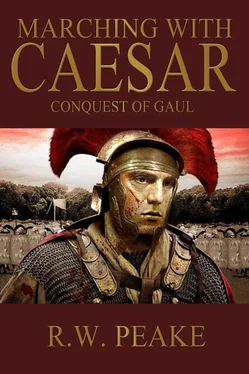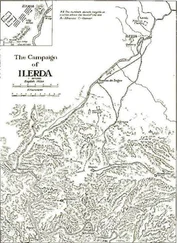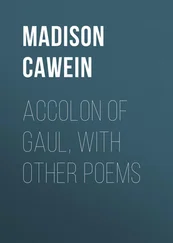R. Peake - Marching With Caesar - Conquest of Gaul
Здесь есть возможность читать онлайн «R. Peake - Marching With Caesar - Conquest of Gaul» весь текст электронной книги совершенно бесплатно (целиком полную версию без сокращений). В некоторых случаях можно слушать аудио, скачать через торрент в формате fb2 и присутствует краткое содержание. Жанр: Исторические приключения, на английском языке. Описание произведения, (предисловие) а так же отзывы посетителей доступны на портале библиотеки ЛибКат.
- Название:Marching With Caesar: Conquest of Gaul
- Автор:
- Жанр:
- Год:неизвестен
- ISBN:нет данных
- Рейтинг книги:3 / 5. Голосов: 1
-
Избранное:Добавить в избранное
- Отзывы:
-
Ваша оценка:
- 60
- 1
- 2
- 3
- 4
- 5
Marching With Caesar: Conquest of Gaul: краткое содержание, описание и аннотация
Предлагаем к чтению аннотацию, описание, краткое содержание или предисловие (зависит от того, что написал сам автор книги «Marching With Caesar: Conquest of Gaul»). Если вы не нашли необходимую информацию о книге — напишите в комментариях, мы постараемся отыскать её.
Marching With Caesar: Conquest of Gaul — читать онлайн бесплатно полную книгу (весь текст) целиком
Ниже представлен текст книги, разбитый по страницам. Система сохранения места последней прочитанной страницы, позволяет с удобством читать онлайн бесплатно книгу «Marching With Caesar: Conquest of Gaul», без необходимости каждый раз заново искать на чём Вы остановились. Поставьте закладку, и сможете в любой момент перейти на страницу, на которой закончили чтение.
Интервал:
Закладка:
Caesar sorted things out in Illyricum then headed back to the army, arriving in late spring, a bit later than usual for him because of the troubles in his other province. Working feverishly to finish work on the new fleet, this was followed by the preparations always necessary at the start of campaign season. The men of the army were heartened to hear that this time, we were going to do things in a manner that we in the ranks considered the proper way; we were bringing all of our heavy gear, along with a force of 2,000 cavalry. With the fleet finished, we took our first boat ride of the season, this time down the Sequana to the mouth of the river then the short distance up the coast to Portus Itius, designated as the place from which the fleet would sail. Perhaps we were getting used to it, or perhaps it was just because we were on the river, then in sight of the coast the whole way, but the seasickness was much less widespread this time. Arriving at the camp erected by the other Legions who spent their winter at Portus Itius building their part of the fleet, we all settled in to wait for Caesar. He arrived, but was in camp no more than a day or two when word of trouble with the Treveri was reported to him. After assessing the situation, Caesar deemed that it was too dangerous to leave until after we returned from Britannia, so taking his most veteran Legions, the 7th through the 10th, we found ourselves once again marching to the east. The Treveri chief was named Indutiomarus, and apparently he had been loudly claiming that he pissed on Rome and owed no allegiance to us. The march took almost two weeks, long enough to make us angry that once more we were forced to deal with recalcitrant Gauls. It was a funny thing; when we thought of Gauls as a race, we hated them with a passion because of what we considered to be their treachery and deceitful ways. Yet when we dealt with them individually, it was hard to find a Gaul that we did not like. They are a strange race, and even now after three decades under Roman rule and having lived among them all this time, I still do not feel that I truly know or understand them. In some things I would trust them with my life, while in others I would not be shocked if they tried to cut my throat. That spring, we found ourselves marching once again because of some faithless petty chief who thought he alone could withstand the might of Rome. There was one happy note; for the first time we did not suffer through the first true marching of the spring, the work we did on the ships keeping us more fit than we would have thought possible. Consequently, we retired each night without the aches, soreness and total fatigue that was always present in the past, and this marked something of a turning point, because we no longer complained as loudly when we were ordered to perform exertions during the winter.
Our confrontation with the Treveri was anticlimactic to say the least. Approaching their main town, just the sight of us in battle array was enough to send Indutiomarus scurrying out to claim that Caesar must have heard wrong, he made no such claims. To be sure of his good faith, Caesar took an unusually large number of hostages, including the son of Indutiomarus, whereupon we immediately turned around to march back to the coast. We were not happy, but neither were we surprised at this point, having learned that Gauls are capable of any type of behavior. Making a few stops on the way back, Caesar took the opportunity to adjudicate local disputes and give the locals a glimpse of the Roman army as a reminder of who had defeated them once, and would do so again if need be. Whenever he met a local delegation, he made sure that we were there in the forum in formation, requiring the Gauls to pass between our silent ranks and it was clear to all of us that they were intimidated, exactly the effect for which Caesar hoped.
Getting back to the main camp, we began our final preparations to sail to the island. Caesar selected five of the eight Legions to sail with him; of course we were selected, yet we were a bit surprised when we heard that Labienus, who had almost always been our commander on detached operations, was going to be left behind to baby-sit the 11th, 13th and 14th. I have always wondered if this was the real reason that in the difficulties that ensued years later, Labienus chose to turn on his old general. We were also a bit surprised by the inclusion of the 12th, for the reasons I have previously mentioned, and we speculated that Caesar was giving them one last chance to redeem themselves. Also sailing with us was a large number of Gallic chieftains and their personal escorts. It was Caesar’s way of keeping an eye on them, especially since he had already seen more than sufficient evidence to convince him that if he left these rascals behind, they would in all likelihood make a good deal of trouble for him. Included in this group was one Dumnorix, one of the more powerful chiefs of the Aedui, even having coins with his name and likeness struck to act as the currency of his people. He was reputed to be the leader of the anti-Roman faction of the Aedui, who as a tribe still bore the title of Friend and Ally of Rome, so of all the chieftains, Dumnorix was the one whom Caesar wanted to keep an eye on most. Once the chiefs were summoned and arrived at Portus Itius, all was ready to depart. Then we sat to wait for a more favorable wind.
We ended up waiting three weeks, the wind continually blowing from the northwest and making sailing in that general direction impossible. Being prepared to embark at a moment’s notice, since the wind in this region is notoriously fickle, we were more or less confined to our Cohort area for days. Naturally the waiting got very tiresome, the army more than ready to depart, so it was not long before we were at each other’s throats. I had to break up more fights than I can remember, despite the fact that I was just as raw as everyone else and wanted to leave just as badly. I think this marked the point when I finally accepted the burden of keeping my personal feelings completely hidden and separate from the actions I was taking, because I secretly agreed with the malcontents; I was just as ready to go as they were, although I could not act in such a manner. In the past I struggled with this feeling but now, finally, I fully accepted it. I made sacrifices to the gods in control of such things as wind and tides almost daily, yet neither my supplications nor those of the rest of the men were answered for almost a month.
The waiting was not just hard on us; the delay obviously wore on the Gallic chiefs who were accompanying us to the point Dumnorix of the Aedui finally decided that he had enough waiting. Just a day before we ended up embarking, he left the camp, despite Caesar’s express orders to the contrary. Caesar could not allow this kind of flagrant disobedience, so he sent a detachment of cavalry to catch up with Dumnorix and bring him back to the camp but he refused to cooperate, choosing instead to fight, whereupon he was cut down by our cavalry. The other Gauls in the camp were enraged by Caesar’s action, yet could do nothing about it, although their sullen expressions and hostile attitude was a clear enough message for all of us that we had to watch them closely the entire expedition. Commius was coming with us again, along with a Trinova named Mandubracius. Perhaps the potential unrest was the reason that Caesar chose Labienus to stay behind, since he was considered Caesar’s most able Legate. Whatever the case, it was on the sixth day of the month now named for Caesar that we began the loading of the army, and it was during the loading process that I had my first brush with a new Tribune accompanying the expedition. His name was Marcus Antonius, and even now, all these years after his death I still have mixed feelings about the man. When I first laid eyes on him, I saw he was just a couple of years older than I was; he was an incredibly handsome man, and despite the fact he was not nearly as tall as I was, his physique closely matched mine. Heavily muscled in the chest and arms, tapering down to a narrow waist, with strong thighs and huge calves, he radiated an animal magnetism that was clear to see even then. He had curly dark hair, and his facial features were strong, with a thoroughly Roman nose, thick full lips, strong jaw and somewhat dimpled chin. Hearing him before I saw him, he was roaring in laughter at a joke that I did not hear, and I first saw him standing on the docks, waiting to board with the 10th. Surrounded by rankers like me and my friends, their faces were split in wide grins at whatever jest he found so hilarious. Antonius was a man’s man; carelessly thoughtful, extremely generous to his friends, and preferring the company of the common soldier than to those of his class, at least in those days. He could also be petty and extremely vindictive; just ask poor Cicero with his hands nailed to the door of the Senate house. Antonius was also extremely unpredictable, yet even with his faults I found it extremely hard to dislike him, even many years later, after he changed so drastically, but I am getting ahead of myself. In that moment on the docks, Vibius was taken with him immediately, having left our section to wander over to see what the fun was about. Also accompanying us on this voyage was the younger brother of the aforementioned Cicero, along with Gaius Trebonius, yet another feckless, faithless bastard who owed his rise to the man he later helped slaughter. But all these events I was happily unaware of; instead I was just relieved that we were finally about to sail back to Britannia to do the job properly.
Читать дальшеИнтервал:
Закладка:
Похожие книги на «Marching With Caesar: Conquest of Gaul»
Представляем Вашему вниманию похожие книги на «Marching With Caesar: Conquest of Gaul» списком для выбора. Мы отобрали схожую по названию и смыслу литературу в надежде предоставить читателям больше вариантов отыскать новые, интересные, ещё непрочитанные произведения.
Обсуждение, отзывы о книге «Marching With Caesar: Conquest of Gaul» и просто собственные мнения читателей. Оставьте ваши комментарии, напишите, что Вы думаете о произведении, его смысле или главных героях. Укажите что конкретно понравилось, а что нет, и почему Вы так считаете.












